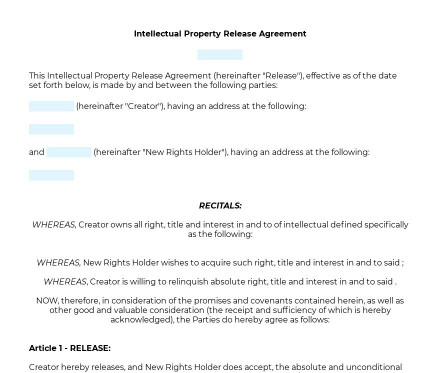Intellectual Property Release Form Free
When the owner of the work (such as the movie, book, or writing) assigns all of its rights to another person, this Intellectual Property Release Agreement may be used.


 Template Overview
Template Overview
When the owner of the work (such as the movie, book, or writing) assigns all of its rights to another person, this Intellectual Property Release Agreement may be used. This agreement is also known as a Release. In other words, the artist (the owner of the work) agrees that his art would be used for other purposes and would no longer be subject to his rights. Although it is not popular, such cases occur in practice.
All works created in the world are considered as intellectual property. Therefore, by agreeing to assign the rights to another person, the artist agrees that he will no longer own the intellectual property. The person acquiring the work can do whatever he wants to do with it, as well as copy, distribute and publish it. In Intellectual Property Release Agreements, royalties, and other monetary compensation are generally not paid because the entirety of the work is being released.
Note that this document differs from the License Agreement. In a License Agreement, the work's owner allows using his art for other purposes, but still has his rights to the art.
You fill out a form. The document is created before your eyes as you respond to the questions.
At the end, you receive it in Word and PDF formats. You can modify it and reuse it.
 How to use this template
How to use this template
If an artist wishes to assign the rights to his work, he can use this document. Also, a person wishing to obtain rights to work may use this document. In this document, all the details of the work of intellectual property that is being released are included.
Note that the artist won't have any rights to his work after signing this document. Also, he won't be paid any royalties. Therefore, the artist should only use this document if he agrees that the other person will have full rights to the work he has created.
A completed document should be printed and signed by both parties.
 Applicable law
Applicable law
No laws govern Intellectual Property Release Agreements. Overall, intellectual property in the United States is covered under primarily federal law, with the primary statute applicable being the Copyright Act of 1976. We recommend adding as much information as possible in case any future disputes arise.
Ready to build your document from this template?


 Please wait
Please wait
